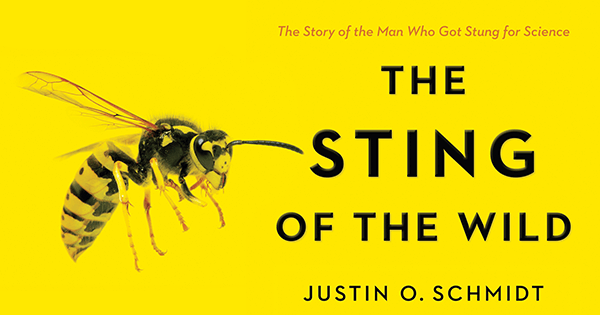The Sting of the Wild
Read an excerpt from Justin O. Schmidt’s new book about venomous bugs

Summer is upon us, and with it the season of bug bites: mosquitoes, ticks, ants, spiders, and the most dreaded—bees and wasps. Why do stinging insects have such a hold on our most imaginative fears?
In The Sting of the Wild, entomologist Justin O. Schmidt lays bare the mysteries of why stinging insects—from fire ants and honey bees to all manner of wasps—sting at all, whether it’s self-defense, murderous competition, or even house-hunting (e.g., the Glyptapanteles wasp, which paralyzes caterpillars with its sting and lays its eggs inside for the larval feast). Schmidt is so committed as a guide to the insect underworld that he even developed his own Schmidt Sting Pain Index, which numerically ranks the agony of the 83 stings he’s sampled thus far. Read an excerpt from his new book, which explores the history of our cnidophobia—though not Schmidt’s apparent immunity to it.
Aristotle, some 2,300 years ago, was the first scientist to write about yellowjackets and hornets. He described their stings as stronger than the stings of honey bees. Aristotle provided many accurate descriptions of their lives. He noted that drones were stingless and debated whether their leaders (queens) had stings. (He concluded that they likely had stings but did not put them to use.) An era of superstition and romantic ignorance followed Aristotle. Romans believed that yellowjackets were generated from dead horses, that hornets were special, emanating from dead warhorses, and that honey bees emerged from dead bulls. These beliefs continued into sixteenth-century Europe. Only in 1719 were the beginnings of modern scientific understanding of wasps established by the observant French naturalist M. de Reaumur.
Do these stories and history tell us that yellowjackets and hornets are winners in the human-stinging insect game of life? Several lines of evidence suggest the answer is yes. In the United States, only about 50 people die per year from the combined stings of all stinging insects (wasps of various types, honey bees, and fire ants). At the same time, 10,000 times as many people die from smoking; and diabetes kills a thousand times as many. Do we tell stories at cocktail parties of our narrow escape from a smoke-filled environment or of overcoming the risk of that enticing sugary, fatty doughnut at the coffee break? But we relish telling stories about surviving an encounter with a stinging insect. The message seems clear. Stinging insects win the emotional fear game. We are afraid, if not outright petrified, of stinging insects; yet, we fear not smoking, diabetes, and other many-times-more-dangerous and preventable aspects of life. Until the advent of modern technology and ways of killing yellowjackets, the wasps won, and we largely left them alone to go their own way, doing exactly what they wanted.
The evolutionary mind game between humans and hornets has been fascinating. We do not simply fear stinging insects; we entertain ourselves with our fear of them. We relish and embellish the fearfulness of stinging insects to make an even better story. One sunny July afternoon in 1999 an editor of Cosmopolitan magazine called and left a message that she wished to interview me. Not fancying myself as an expert on women’s social culture or fashion, I asked my student Andrea for background information about the magazine. You should have seen the horror on her face: “Cosmo wants to interview you?” With trepidation, I approached the interview. To my relief, Cosmopolitan sought my knowledge about stinging insects. Why was Cosmopolitan interested in yellowjackets? Turned out they were worried about the safety of their young readers as they frolicked in the woods during fine autumn afternoons, and the editors wished to write a reassuring story. Score one point for the yellowjackets.
From The Sting of the Wild by Justin O. Schmidt, published by Johns Hopkins University Press in 2016. Reproduced with permission.

